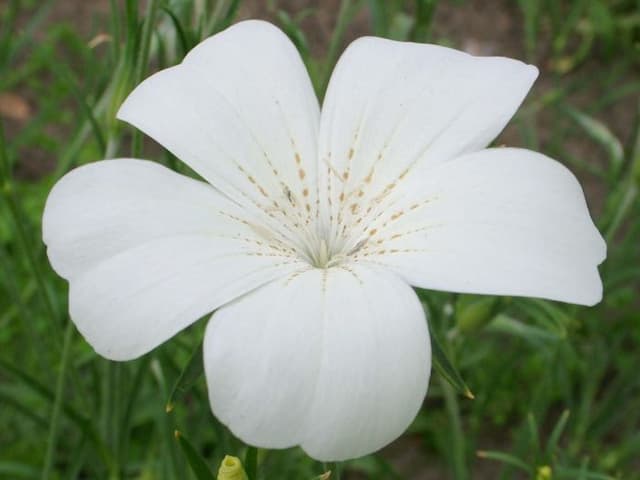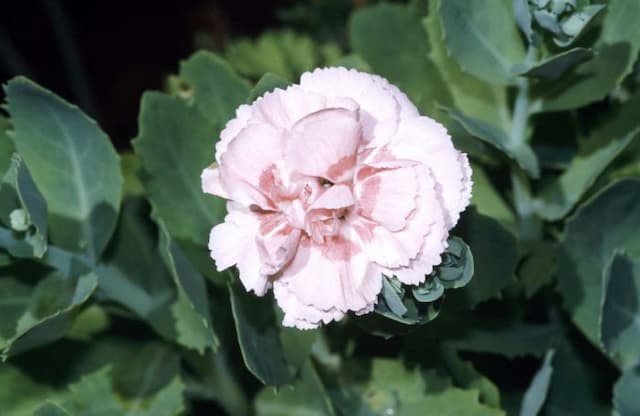Carnation Dianthus 'Devon Pride' (p)

ABOUT
Dianthus 'Devon Pride' is a striking ornamental plant that boasts vibrant colors and a pleasing form. The colorful petals of the Devon Pride are typically a deep pink or red with a lighter fringe, often presenting a delicate and slightly ruffled appearance. The blooms may sometimes have a subtle pattern or be solid in color, exuding a lush and velvety texture. At the center, the flower often showcases a contrasting eye, catching the attention of onlookers and enhancing its overall beauty. The foliage of the Devon Pride is slender and green, forming a neat and compact tuft that serves as an attractive base for the flowers. Its leaves are often narrow with a bluish-green hue, giving off the impression of a soft, grassy mound. The leaves may have a waxy or slightly glaucous coating, which adds to its charm and resilience. Overall, the appearance of Dianthus 'Devon Pride' is one of elegance and vibrant beauty, with its rich, colorful blossoms standing out against the soft green of its foliage. It's a popular choice for gardeners looking to add a pop of color and texture to their gardens without overwhelming the landscape.
About this plant
 Names
NamesFamily
Caryophyllaceae
Synonyms
Devon Pride, Cheddar Pink, Perpetual Carnation
Common names
Dianthus 'Devon Pride'
 Toxicity
ToxicityTo humans
Dianthus 'Devon Pride', commonly known as Pink, is not widely recognized as a toxic plant to humans. There is no common documentation of toxicity or poisoning symptoms experienced by humans due to ingesting or handling Pink. It's always a good practice to avoid ingesting plants that are not specifically meant for consumption, as they can sometimes cause negative reactions in sensitive individuals due to the presence of saponins or other compounds.
To pets
Pink, the common name for Dianthus 'Devon Pride', is generally considered non-toxic to pets. There are no well-documented cases of poisoning in pets such as dogs and cats from ingesting this plant. However, it is advisable to prevent your pets from eating ornamental plants as they might cause mild gastrointestinal upset in some cases. If a pet does ingest a significant amount of the plant and exhibits symptoms such as vomiting or diarrhea, it is best to consult with a veterinarian.
 Characteristics
CharacteristicsLife cycle
Perennials
Foliage type
Evergreen
Color of leaves
Blue-green
Flower color
Pink
Height
1 feet 6 inches (45 cm)
Spread
1 feet (30 cm)
Plant type
Herb
Hardiness zones
7
Native area
Europe
Benefits
 General Benefits
General Benefits- Attractive Flowers: Produces striking pink or red flowers that add a splash of color to gardens and landscapes.
- Pleasant Scent: Emits a sweet fragrance which can enhance the sensory appeal of a garden space.
- Long Blooming Period: Offers a long flowering season from late spring through early summer, and sometimes again in fall.
- Drought Tolerance: Once established, has a good tolerance for dry conditions, requiring less water compared to other plants.
- Cold Hardiness: Can withstand cold temperatures, making it suitable for growth in a variety of climates.
- Easy to Grow: Generally easy to care for, making it a good choice for novice gardeners or those looking for low-maintenance plants.
- Pest Resistance: Resistant to many common pests, reducing the need for chemical pest control.
- Attracts Pollinators: Flowers attract bees and butterflies, which are beneficial for pollination and the health of the garden ecosystem.
- Compact Size: Typically grows in a tidy, compact mound, which is ideal for borders, rock gardens, or small garden spaces.
- Versatility: Can be grown in containers, beds, and borders, offering flexibility in garden design.
 Medical Properties
Medical PropertiesThis plant is not used for medical purposes.
 Air-purifying Qualities
Air-purifying QualitiesThis plant is not specifically known for air purifying qualities.
 Other Uses
Other Uses- As a natural dye: The brightly colored petals of Dianthus 'Devon Pride' can be used to create a natural dye for fabrics or crafts, imparting a range of hues from soft pink to deep red, depending on the mordant used.
- In potpourri: Dried petals of Dianthus 'Devon Pride' can add color and a mild spicy fragrance to homemade potpourri mixes.
- Edible garnish: Dianthus 'Devon Pride' flowers are edible and can be used as a decorative and flavorful garnish on salads, desserts, and cocktails.
- In bookmarks: Dried petals can be laminated or pressed within clear adhesive paper to create decorative bookmarks.
- As a moth deterrent: The scent of Dianthus 'Devon Pride' can be used in sachets to deter moths from closets and drawers, though it is not as strong as traditional mothballs.
- For flower art: Petals can be used in creative flower art projects, such as floral mandalas or intricate pressed flower arrangements.
- As a sensory garden addition: The tactile and visual appeal of Dianthus 'Devon Pride', along with its distinct scent, makes it an excellent addition to gardens designed for sensory stimulation.
- In photography: The plant's vivid flowers can be used as a stunning subject or backdrop in macro and nature photography.
- In memory gardens: Due to their lasting appeal and association with love and admiration, Dianthus 'Devon Pride' is often planted in memory gardens as a tribute to loved ones.
- In educational activities: Schools or educational programs can use this plant to teach students about pollination, plant growth, and flower structure.
Interesting Facts
 Feng Shui
Feng ShuiThe Carnation is not used in Feng Shui practice.
 Zodiac Sign Compitability
Zodiac Sign CompitabilityThe Carnation is not used in astrology practice.
 Plant Symbolism
Plant Symbolism- Love: The Dianthus flower is traditionally associated with love and admiration. The term "dianthus" was coined by the Greek botanist Theophrastus, and is derived from the Greek words for divine ("dios") and flower ("anthos"). This divine connection often relates to the emotion of love.
- Passion: Its vibrant colors and spicy fragrance signify strong passion and romantic devotion.
- Boldness: 'Devon Pride', with its bold and vibrant hues, can symbolize a brave or daring spirit.
- Purity: In the language of flowers, dianthus often represents purity and innocence.
- Gratitude: Some cultures give Dianthus flowers as a sign of thanks, embodying feelings of appreciation.
 Water
WaterCarnation 'Devon Pride' should be watered once a week, but the frequency may need to increase during hot, dry spells, ensuring that the soil is moist but not waterlogged. It is essential to water deeply, so applying about one gallon of water per plant will ensure that the moisture reaches the roots. During the winter months or in cooler climates, watering can be reduced. Ensure that excess water can drain away to prevent root rot, and always check the top inch of soil for dryness before watering again.
 Light
LightCarnation 'Devon Pride' thrives in full sunlight exposure for at least six hours a day. The best spot for this plant is a sunny, south-facing position where it receives ample light; however, it can also tolerate partial shade. Ensure that the plant is not shaded by taller plants or structures to achieve optimal blooming.
 Temperature
TemperatureCarnation 'Devon Pride' prefers temperatures between 60 and 70 degrees Fahrenheit but can survive in temperatures as low as 20 degrees Fahrenheit and as high as 85 degrees Fahrenheit. The ideal conditions are a mild climate without extreme heat or cold.
 Pruning
PruningCarnation 'Devon Pride' should be pruned to promote bushier growth, remove dead or spent flowers, and maintain a tidy appearance. Deadheading should be done regularly throughout the blooming season. A more thorough pruning may be needed in early spring to remove dead or weak stems, which encourages new growth.
 Cleaning
CleaningAs needed
 Soil
SoilFor Carnation 'Devon Pride', the best soil mix is well-draining and fertile with a pH between 6.7 and 7.3. A mixture of loam, compost, and coarse sand in equal parts will support healthy growth. Regular feeding with a balanced fertilizer will promote lush foliage and vibrant blooms.
 Repotting
RepottingCarnation 'Devon Pride' typically does not require frequent repotting and can be repotted every 2-3 years or when the plant has outgrown its current container. Repot in spring before new growth starts, and ensure that the new pot has adequate drainage.
 Humidity & Misting
Humidity & MistingCarnation 'Devon Pride' prefers moderate humidity levels. Avoid environments that are too dry or too damp, as this can either desiccate the plant or promote disease. A general humidity level around 40-50% is suitable for this plant.
 Suitable locations
Suitable locationsIndoor
Place Carnation 'Devon Pride' near a sunny window and ensure good air flow.
Outdoor
Grow Carnation 'Devon Pride' in full sun with fertile, well-drained soil.
Hardiness zone
3-9 USDA
 Life cycle
Life cycleThe life cycle of Dianthus 'Devon Pride', commonly known as Pinks or Carnations, begins with seed germination, which requires a well-draining soil mix and a temperature of around 65-75°F (18-24°C). Once germinated, the seedlings grow into vegetative plants, with the development of a rosette of slender, blue-green leaves and sturdy stems. As the plant matures, it enters the flowering stage, usually in late spring to early summer, where fragrant, ruffled flowers in shades of pink and red bloom profusely. After pollination, often assisted by insects, the flowers produce small, capsule-like fruits containing seeds that mature and can be collected for propagation. Pinks are short-lived perennials or biennials, meaning they typically live for a few years before they need to be replaced, although they can self-seed in conducive conditions. In favorable climates, the plant may enter a period of dormancy during the colder months, only to resume growth with the return of warmer temperatures.
 Propogation
PropogationPropogation time
Spring to Summer
Propogation: Dianthus 'Devon Pride', also known as pinks, are commonly propagated by cuttings. This method is quite popular among gardeners because it's effective and allows for preserving the characteristics of the parent plant. The best time to take cuttings for pinks is during late spring or early summer when the plant's growth is vigorous and healthy. To propagate pinks by cuttings, find a non-flowering shoot and cut a 4- to 6-inch (10-15 cm) section. Remove the lower leaves and dip the cut end into rooting hormone powder to encourage root development. Plant the cutting into a mixture of perlite and peat moss, and keep it in a well-lit area, avoiding direct sunlight, with temperatures around 70°F (21°C). To maintain humidity, cover the cutting with a plastic bag or place it in a propagator, and in a few weeks, it should develop roots, ready to be transplanted.








![Pink [Bubblegum]](/_next/image?url=https%3A%2F%2Fplants-admin.emdemapps.com%2Fimages%2Fplants%2F%2Fimages%2F604b596f31cbb.png&w=640&q=75)
